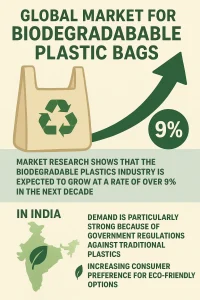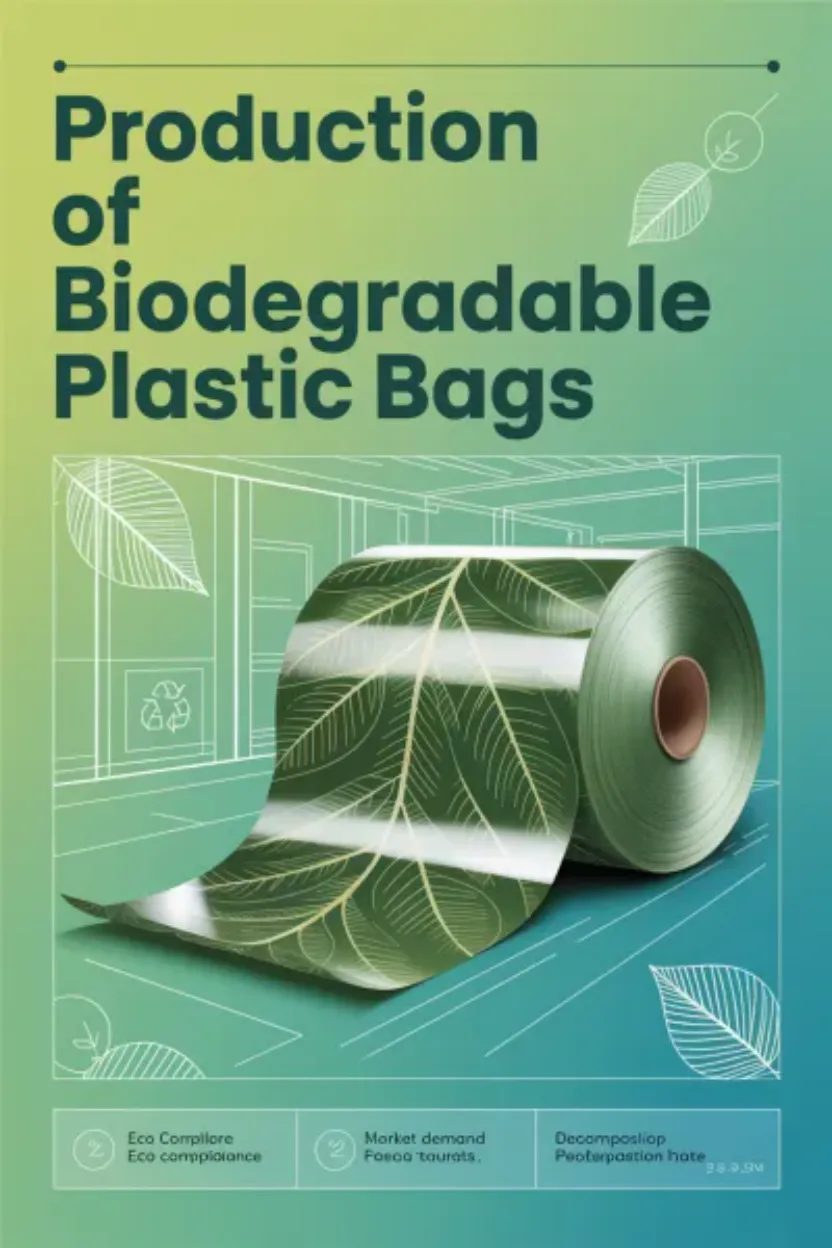The rapid growth of urbanization and consumerism has led to a rising demand for packaging materials. For decades, plastic bags have held a dominant position in the global packaging market due to their low cost, strength, and convenience. However, their non-biodegradable nature has caused serious environmental problems, including pollution in land, rivers, and oceans. Now, governments, environmentalists, and conscious consumers worldwide are pushing for sustainable alternatives. This shift creates significant opportunities in the production of biodegradable plastic bags. Entrepreneurs and startups with clear visions can enter this market to meet the increasing global demand for eco-friendly packaging options.
Biodegradable Plastic Bags Are Important
Biodegradable plastic bags are crucial not only because they are eco-friendly but also because they comply with strict environmental regulations. Many countries, including India, have banned or restricted single-use plastics, which has increased the need for alternatives. These biodegradable bags are made from renewable materials like corn starch, polylactic acid (PLA), and other plant-based polymers. They decompose naturally, reducing environmental impact and supporting sustainability goals.
Consumers in urban and semi-urban areas are becoming more aware of their choices. Retailers, food outlets, e-commerce companies, and supermarkets now prefer biodegradable bags as part of their sustainability efforts. With this growing acceptance, producing biodegradable bags is not only responsible but also a profitable business opportunity with long-term growth potential.
Detailed project report: Production of Biodegradable Plastic Bags from Corn & Cassava Starch Granules
Advantages of Producing Biodegradable Plastic Bags
Making biodegradable bags has several advantages for entrepreneurs. First, the global push for sustainability guarantees lasting demand, making this business future-proof. Second, government support through subsidies, incentives, and favorable policies for green businesses increases profitability. Third, using biodegradable bags provides a branding advantage, allowing manufacturers to market themselves effectively to potential clients.
Additionally, the biodegradable plastic bag industry is diverse. These bags can be customized for various sectors, including retail, food delivery, packaging, agriculture, and healthcare. This diversity helps spread demand across different industries and creates a steady cash flow. For entrepreneurs, this variety reduces risks while increasing revenue potential.
How Biodegradable Plastic Bags Are Made
The production of biodegradable plastic bags follows a specialized process that differs from traditional plastic bag manufacturing. Raw materials typically include biodegradable polymers like PLA, PHA, or starch blends sourced from renewable resources. These materials are processed in extrusion machines, where the resin is melted and formed into thin films, then cut into bag shapes through heat sealing.
The process includes several steps. It starts with preparing and blending raw materials, then extruding them to create sheets or films. These films are printed and colored to meet customer needs. The final step is cutting and sealing the films into various bag sizes and shapes, such as shopping bags, carry bags, garbage bags, and packaging pouches. Quality control is maintained throughout to ensure the bags meet industry standards for strength, flexibility, and biodegradability.
Check out our books for more detailed information and insights.
Market Potential and Growing Demand

The global market for biodegradable plastic bags has been growing quickly due to rising bans on single-use plastics. Market research shows that the biodegradable plastics industry is expected to grow at a rate of over 9 percent in the next decade. In India, the demand is particularly strong because of government regulations against traditional plastics and increasing consumer preference for eco-friendly options.
The market is driven by multinational retailers, online food delivery services, and e-commerce companies that need to use eco-friendly packaging. In regions like Europe, North America, and parts of Asia-Pacific, strict sustainability norms are increasing the demand for biodegradable bags. Entrepreneurs entering this market can serve local needs and explore export opportunities, especially as global awareness of plastic pollution grows.
Government Support and Policies
Government policies are essential for boosting the production of biodegradable plastic bags. In India, the Plastic Waste Management Rules and state-level bans on single-use plastics have raised the demand for biodegradable options. Governments also support these industries with subsidies for machinery, tax incentives, and easier approvals under green industry standards.
On the international front, the European Union has set clear sustainability goals that encourage the use of biodegradable alternatives. The United States and several Asian countries are following similar paths. These policy frameworks create a favorable environment for businesses looking to produce biodegradable bags, lowering entry barriers and improving profitability.
Related articles:-Feasibility and Techno-Economic Viability Study on Production of Biodegradable Corn Starch Plastic Granules
Key Steps to Start a Biodegradable Plastic Bag Manufacturing Unit
Starting a biodegradable plastic bag manufacturing unit requires several strategic steps. Choosing the right location is critical, ideally near urban centers with strong demand. It is also important to ensure access to raw material suppliers and skilled labor. Selecting the right machinery is essential, as biodegradable plastics need specialized extrusion and sealing equipment.
Compliance with environmental regulations and certifications is vital for gaining credibility and market acceptance. Entrepreneurs should also focus on branding, building distribution networks, and forming partnerships with retailers and e-commerce companies. Thorough planning in these areas will help ensure a smooth setup and successful long-term operations.
Opportunities and Challenges
The biodegradable plastic bag market presents significant opportunities but also challenges. Opportunities come from increasing global demand, regulatory initiatives, and growing consumer awareness. Entrepreneurs who establish themselves early in this field can enjoy benefits such as brand recognition and access to export markets.
Challenges include higher production costs compared to traditional plastics, limited raw material availability in some regions, and the need for ongoing technological updates. However, as production scales up and technology advances, costs are expected to decrease, making biodegradable bags more competitive. Entrepreneurs focused on quality, innovation, and strategic partnerships can navigate these challenges and build a sustainable business.
Support for Entrepreneurs from NPCS
Niir Project Consultancy Services (NPCS) offers comprehensive support to entrepreneurs looking to start biodegradable plastic bag manufacturing. NPCS prepares detailed market surveys and techno-economic feasibility reports that cover manufacturing processes, raw materials, plant layouts, and financial aspects. Their expertise helps entrepreneurs assess the feasibility of launching new businesses, ensuring informed decisions and successful project execution.
Conclusion
Producing biodegradable plastic bags is not only a profitable venture but also a socially responsible one that aligns with global sustainability goals. With governments worldwide banning single-use plastics and increasing consumer demands for eco-friendly options, this sector offers promising growth opportunities.
Entrepreneurs who invest with a commitment to sustainability can secure a strong position in this industry. By taking advantage of government support, focusing on innovation, and seeking guidance from experienced consultants like NPCS, businesses can thrive in the biodegradable packaging market while contributing to a cleaner, greener planet.
Discover the best business ideas for yourself using our startup selector tools
Frequently Asked Questions
Q1. Why are biodegradable plastic bags in demand?
Due to bans on single-use plastics and rising consumer preference for eco-friendly alternatives, demand for biodegradable bags is growing.
Q2. What raw materials are used in biodegradable bag production?
Common raw materials include corn starch, polylactic acid (PLA), PBAT, and other plant-based or compostable polymers.
Q3. Is biodegradable bag production profitable?
Yes, with growing demand, favorable policies, and expanding retail adoption, the business can be highly profitable.
Q4. What licenses and compliances are required for production?
Typical requirements include GST registration, factory registration, pollution control board clearance, and local municipal permissions.
Q5. Can biodegradable bags be exported?
Yes, there is international demand for sustainable packaging, so export opportunities are available with proper certifications and standards compliance.









